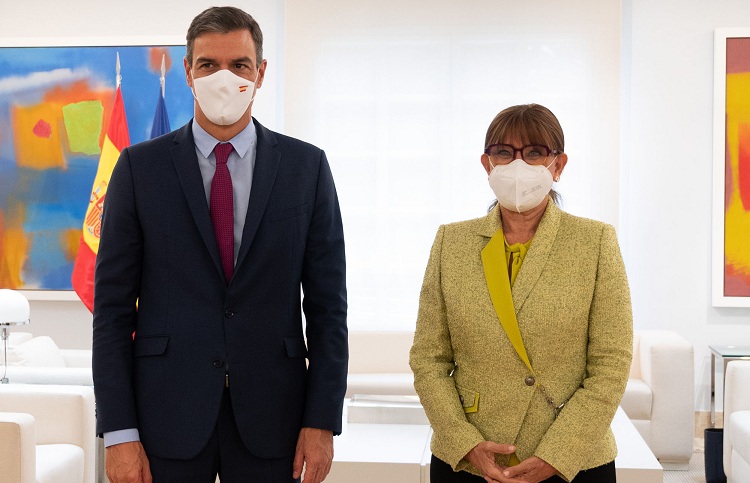Luis Ayllón
The Ibero-American Secretary General, Rebeca Grynspan, went to the Moncloa Palace yesterday to bid farewell to the President of the Government, Pedro Sánchez, days before leaving her post to head the United Nations Conference on Trade and Development (UNCTAD).
Grynspan, who will be received today by His Majesty the King at the Zarzuela Palace, will finish her term as Ibero-American secretary general on Friday 11, which she began in April 2014 and in which she has carried out an intense activity, recognised by all the countries in the region.
On his Twitter account, Pedro Sánchez thanked Grynspan for her “excellent work as Ibero-American secretary general” and expressed his best wishes for the new phase she is undertaking. “We continue to make progress in a common Ibero-American space for political agreement and greater cooperation”, added the head of government.
In turn, the Secretary General thanked the Spanish government for its support for her work, while highlighting Spain’s role in the Ibero-American community.
The departure of the Costa Rican Rebeca Grynspan from the Ibero-American General Secretariat (SEGIB) will speed up announcements about possible candidates to occupy a post that is elected by consensus by all the member countries of the Ibero-American Conference and which is not usually an easy task, given the differences that exist in the region. The election of Grynspan herself to replace the first Ibero-American Secretary General, the Uruguayan Enrique Iglesias, was not a bed of roses.
Now, some names have already emerged as possible candidates, including former Mexican minister and former OECD secretary general José Ángel Gurría; former Argentine foreign minister Susana Malcorra; and former Colombian foreign minister María Ángela Holguín, who a few weeks ago was said to have the backing of Spain, but not of Iván Duque’s government.
It is normal for candidates to have the support of their country’s government, as without it it is difficult for the candidacy to prosper, and in the case of the aforementioned candidates, this does not seem to be the case at the moment. Spain, which hosts the Ibero-American General Secretariat, does not present candidates, but it can show its preference for any of them, which is quite relevant when it comes to decision-making, given Spain’s weight in the Ibero-American community.
In any case, the Spanish government has so far not publicly shown its preference for any candidate, although some sources suggest that it would like the post to be occupied, once again, by a woman.
Formally, the deadline for the presentation of candidatures will open on the 15th. Diplomatic circles point to the possibility that the Ibero-American foreign ministers might already have reviewed the candidacies on 23 September, at the traditional breakfast held in New York during the United Nations General Assembly.
It is more likely that the matter will be discussed at the meeting of foreign ministers called for 26 November by the pro tempore secretary currently held by the Dominican Republic, the host of the Ibero-American Summit in 2022, which is expected to be held in the autumn of that year.
In principle, the foreign affairs ministers should be the ones to decide on the name of the new head of the SEGIB, but they could leave the matter for a later meeting in April.
April was precisely the month in which Grynspan’s second term of office came to an end, and she has brought forward her departure to take charge of UNCTAD, leaving SEGIB in the hands of the deputy secretary general, the Brazilian Marcos Pinta Gama, who has been in the post for just over two years.






